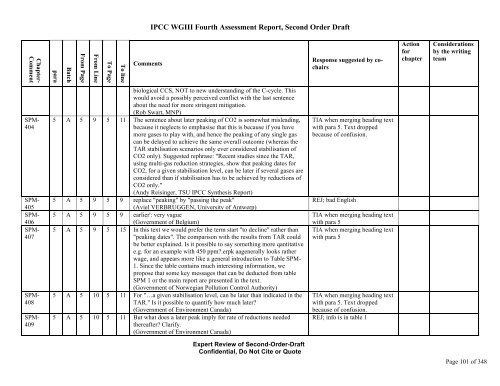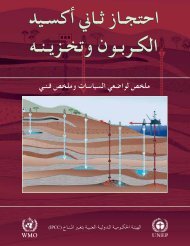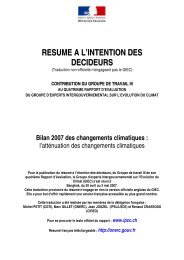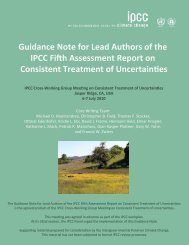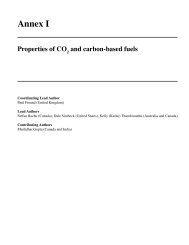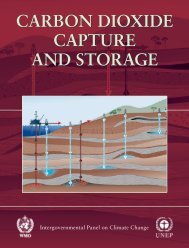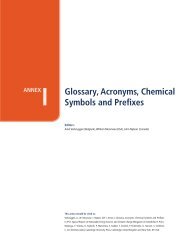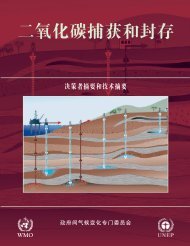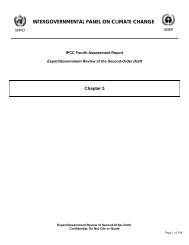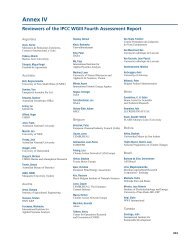SODBatch A&B SPM Comments co-chair response final ... - ipcc-wg3
SODBatch A&B SPM Comments co-chair response final ... - ipcc-wg3
SODBatch A&B SPM Comments co-chair response final ... - ipcc-wg3
Create successful ePaper yourself
Turn your PDF publications into a flip-book with our unique Google optimized e-Paper software.
Chapter-<br />
Comment<br />
<strong>SPM</strong>-<br />
404<br />
<strong>SPM</strong>-<br />
405<br />
<strong>SPM</strong>-<br />
406<br />
<strong>SPM</strong>-<br />
407<br />
<strong>SPM</strong>-<br />
408<br />
<strong>SPM</strong>-<br />
409<br />
para<br />
Batch<br />
From Page<br />
From Line<br />
To Page<br />
To line<br />
<strong>Comments</strong><br />
IPCC WGIII Fourth Assessment Report, Se<strong>co</strong>nd Order Draft<br />
biological CCS, NOT to new understanding of the C-cycle. This<br />
would avoid a possibly perceived <strong>co</strong>nflict with the last sentence<br />
about the need for more stringent mitigation.<br />
(Rob Swart, MNP)<br />
5 A 5 9 5 11 The sentence about later peaking of CO2 is somewhat misleading,<br />
because it neglects to emphasise that this is because if you have<br />
more gases to play with, and hence the peaking of any single gas<br />
can be delayed to achieve the same overall out<strong>co</strong>me (whereas the<br />
TAR stabilisation scenarios only ever <strong>co</strong>nsidered stabilisation of<br />
CO2 only). Suggested rephrase: "Recent studies since the TAR,<br />
using multi-gas reduction strategies, show that peaking dates for<br />
CO2, for a given stabilisation level, can be later if several gases are<br />
<strong>co</strong>nsidered than if stabilisation has to be achieved by reductions of<br />
CO2 only."<br />
(Andy Reisinger, TSU IPCC Synthesis Report)<br />
5 A 5 9 5 9 replace "peaking" by "passing the peak"<br />
(Aviel VERBRUGGEN, University of Antwerp)<br />
5 A 5 9 5 9 earlier': very vague<br />
(Government of Belgium)<br />
5 A 5 9 5 15 In this text we would prefer the term start "to decline" rather than<br />
"peaking dates". The <strong>co</strong>mparison with the results from TAR <strong>co</strong>uld<br />
be better explained. Is it possible to say something more qantitative<br />
e.g. for an example with 450 ppm?.erpk aagenerally looks rather<br />
wage, and appears more like a general introduction to Table <strong>SPM</strong>-<br />
1. Since the table <strong>co</strong>ntains much interesting information, we<br />
propose that some key messages that can be deducted from table<br />
<strong>SPM</strong> 1 or the main report are presented in the text.<br />
(Government of Norwegian Pollution Control Authority)<br />
5 A 5 10 5 11 For "…a given stabilisation level, can be later than indicated in the<br />
TAR." Is it possible to quantify how much later?<br />
(Government of Environment Canada)<br />
5 A 5 10 5 11 But what does a later peak imply for rate of reductions needed<br />
thereafter? Clarify.<br />
(Government of Environment Canada)<br />
Expert Review of Se<strong>co</strong>nd-Order-Draft<br />
Confidential, Do Not Cite or Quote<br />
Response suggested by <strong>co</strong><strong>chair</strong>s<br />
TIA when merging heading text<br />
with para 5. Text dropped<br />
because of <strong>co</strong>nfusion.<br />
REJ; bad English<br />
TIA when merging heading text<br />
with para 5<br />
TIA when merging heading text<br />
with para 5<br />
TIA when merging heading text<br />
with para 5. Text dropped<br />
because of <strong>co</strong>nfusion.<br />
REJ; info is in table 1<br />
Action<br />
for<br />
chapter<br />
Considerations<br />
by the writing<br />
team<br />
Page 101 of 348


